HDPE Water Pipe: Solution for Modern Water Supply Systems
In today’s infrastructure landscape, HDPE water pipes (High-Density Polyethylene) have emerged as a preferred choice for water supply systems across the globe. Whether for municipal projects, industrial water transport, or residential supply networks, HDPE pipes offer unmatched advantages in durability, performance, and environmental sustainability.

What is HDPE Water Pipe?
HDPE (High-Density Polyethylene) water pipe is a flexible, durable, and corrosion-resistant piping solution widely used for potable water supply systems, irrigation, industrial applications, and more. Made from high-density polyethylene resin, HDPE pipes offer exceptional performance and longevity in both underground and above-ground installations.
Key Features of HDPE Water Pipes
1. Durability and Longevity
HDPE water pipes have an expected service life of over 50 years, even under harsh environmental conditions. Unlike metal or concrete alternatives, HDPE pipes do not corrode, rust, or degrade due to chemical exposure.
2. Leak-Free Joints
Using heat fusion, HDPE pipes can be joined seamlessly, creating a monolithic system that virtually eliminates leaks. This is a huge advantage for municipal water systems looking to reduce water loss.
3. Flexibility
HDPE pipes are highly flexible and can withstand ground movements, making them ideal for areas prone to earthquakes, soil shifts, or heavy traffic loads.
4. Lightweight and Easy to Install
Compared to steel or concrete, HDPE pipes are lightweight, reducing handling and transportation costs. Installation is quicker and often requires less heavy machinery.
5. Chemical and UV Resistance
HDPE pipes are resistant to a wide range of chemicals and UV rays, making them suitable for both underground and above-ground installations.

Applications of HDPE Water Pipes
- Municipal Water Supply
- Agricultural Irrigation
- Industrial Water Transport
- Mining and Slurry Lines
- Stormwater and Drainage Systems
- Fire Protection Lines
HDPE vs. Other Pipe Materials
| Feature | HDPE Pipe | PVC Pipe | Ductile Iron Pipe |
|---|---|---|---|
| Corrosion Resistance | Excellent | Good | Poor |
| Flexibility | High | Moderate | Low |
| Lifespan | 50+ years | 30-40 years | 25-50 years |
| Joint Integrity | Heat-fused (no leaks) | Gasketed (some risk) | Mechanical (leak-prone) |
HDPE Pipe Sizes and Specifications
HDPE water pipes are available in a wide range of diameters and pressure ratings (PN6 to PN25), suitable for low to high-pressure applications. The pipe is typically manufactured according to international standards such as ISO 4427, ASTM D3035, or EN 12201.
For example:
- Diameter Range: 20mm to 1200mm
- Pressure Ratings: PN6, PN8, PN10, PN12.5, PN16, PN20, PN25
- Standard Lengths: 6m, 12m, or custom coils up to 200m for small diameters
Choosing the Right HDPE Pipe
When selecting an HDPE water pipe, consider the following:
- Pressure Rating (PN)
- Pipe Diameter and Wall Thickness (SDR)
- Compliance with Standards (e.g., ISO 4427, ASTM F714)
- Application-Specific Requirements
Conclusion
HDPE water pipe is a modern, reliable, and cost-effective solution for a wide range of water supply needs. Its durability, leak-proof installation, and resistance to environmental challenges make it an excellent investment for both public and private water systems.
Need HDPE Water Pipe for Your Project?
Shelter is a professional HDPE water pipe manufacturer and supplier in China. Contact us today to learn more or get a custom quote.
